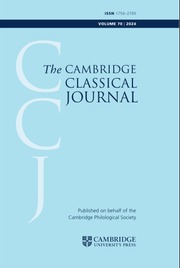No CrossRef data available.
Article contents
The politics of classical allusion at the end of the eighteenth century: radical or redundant?*
Published online by Cambridge University Press: 23 January 2012
Extract
My epigraphs offer a stark contrast in their basic assumptions about the place of classical allusion in eighteenth century writing. The second, published only last year in a series devoted to classical reception, implies that allusion – whether conscious or unconscious – is always ‘significant’; the first, fifteen years old and from the first number of the International Journal of the Classical Tradition, suggests that it is largely incidental and superficial. To be fair to Kennedy, the passage quoted above comes from an abbreviated history of classicism from the Hellenistic period to the twentieth century which could not be expected to offer a nuanced account of the nature of classical allusion in the various periods it discusses; but the basic question remains: is classical allusion in the eighteenth century ornamental or essential?
- Type
- Research Article
- Information
- Copyright
- Copyright © The Author(s). Published online by Cambridge University Press 2010
References
WORKS CITED
Databases/Archives/Dictionaries
Dictionary of British classicists (DBC)
Eighteenth century collections online (ECCO)
National record office (NRO)
Oxford dictionary of national biography (ODNB)
Periodical
(1798–1810) The anti-Jacobin review and magazine, London.
Catalogue
(1802) Catalogue of the library of the late Rev. Gilbert Wakefield, London.
Letters/MS Notes




